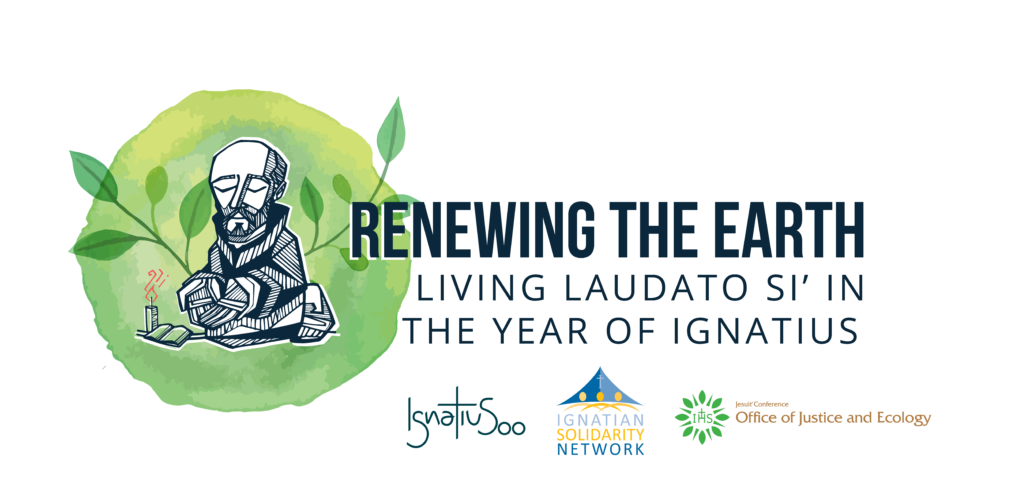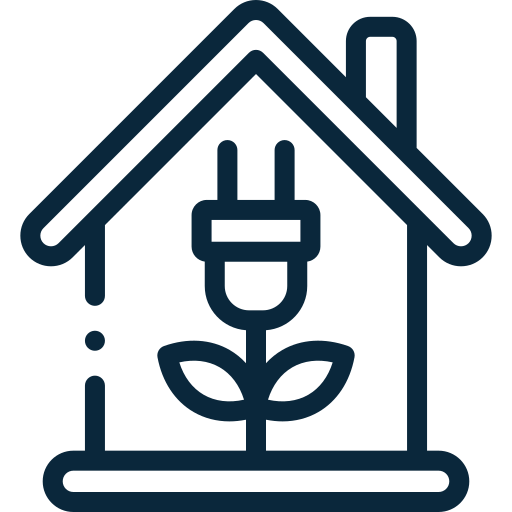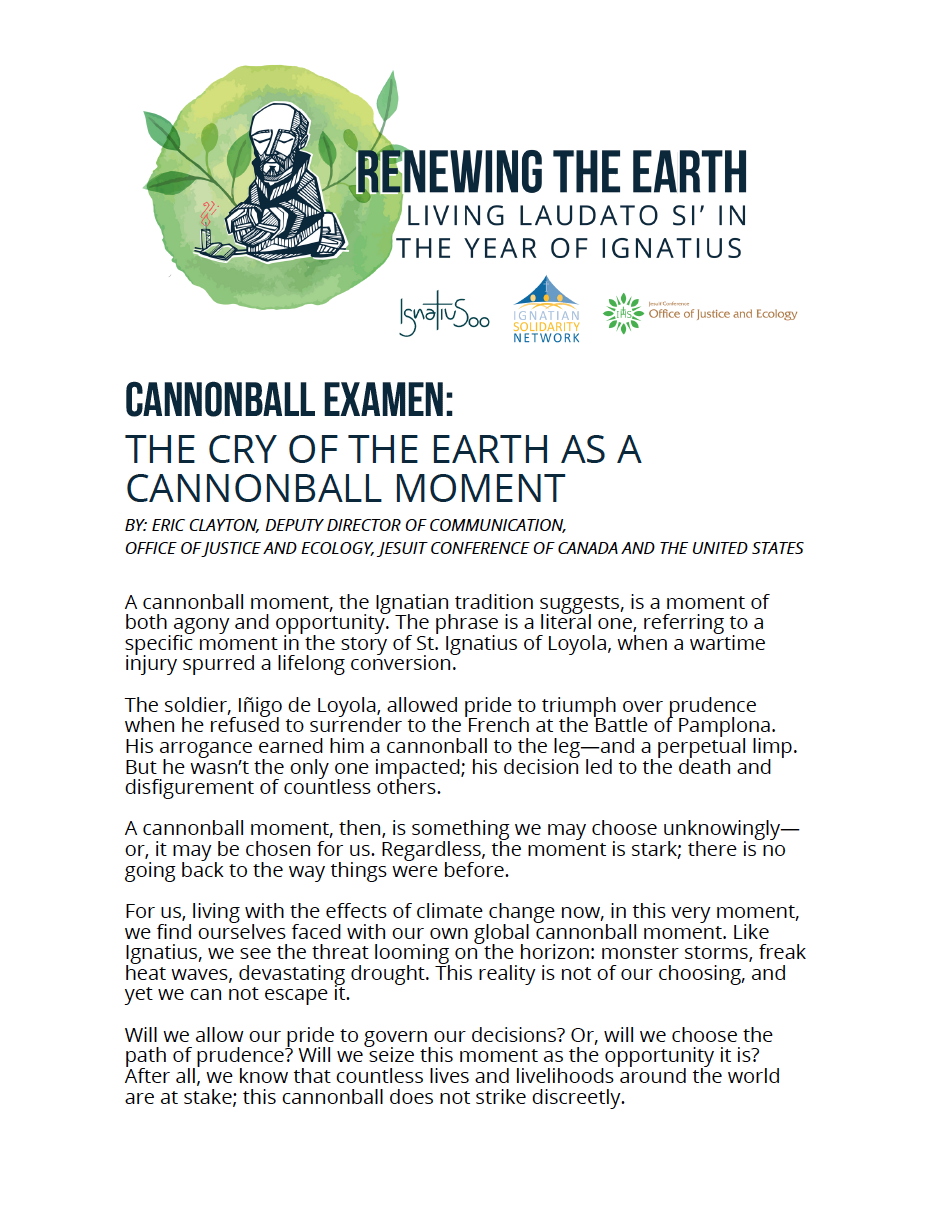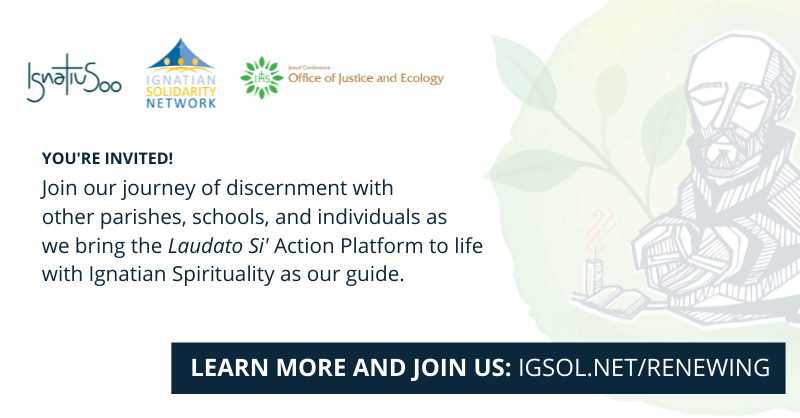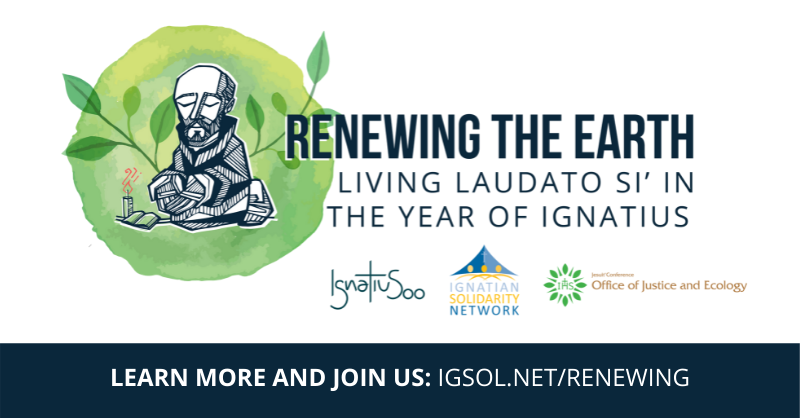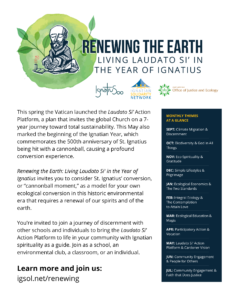IMPLEMENTING THE LAUDATO SI’
ACTION PLATFORM: IGNATIAN STYLE!
This Spring, the Vatican launched the Laudato Si’ Action Platform, embarking the global church on a journey towards integral ecology and total sustainability over the next seven years. In honor of this launch and the Ignatian Year, we invite you to join Renewing the Earth: Living Laudato Si’ in the Year of Ignatius.
Bring the Laudato Si’ Action Platform to life in your community, as you engage in monthly challenges to learn, pray, and act for ecological justice. Starting in September, join us as we explore a monthly theme from St. Ignatius’ life in conversation with an element of the Laudato Si’ Action Platform.
WHO SHOULD PARTICIPATE?
- Individuals
- Creation Care Teams (and their parishes!)
- Campus Ministries
- Teachers/ Professors (and their classrooms!)
- School Clubs
- Religious Congregations
- Families
- YOU!
IGNATIAN CONCEPTS AT A GLANCE
THE CANNONBALL MOMENT
500 years ago St. Ignatius of Loyola was hit in the leg with a cannonball, a painful conversion experience that ultimately led him to orient his life toward God, write the Spiritual Exercises, found the Society of Jesus, and live out the Gospel.
GRATITUDE
“For St. Ignatius, our relationship with God is founded on gratitude. God is the infinitely generous giver of gifts and blessings; we respond with gratitude and profuse thanks.”
From Ignatian Spirituality A to Z by Jim Manney
DISCERNMENT
“In the Ignatian tradition, discernment is both a skill and a methodology. The skill is learning how to interpret spiritual senses and interior movements of the heart. The methodology is applying these skills to the choices we face in real life.”
From Ignatian Spirituality A to Z by Jim Manney
THE TWO STANDARDS
“Two Standards is a meditation in the second week of the Spiritual Exercises that explores what it means to make a decision to serve Christ.”
From Ignatian Spirituality A to Z by Jim Manney
MAGIS
“Magis means a striving for excellence, a determination to do more, an unwillingness to settle for the familiar… Striving for the magis is about being willing to go deeper.”
From Ignatian Spirituality A to Z by Jim Manney
CONTEMPLATIVE IN ACTION
“The term was coined by Jerome Nada, one of Ignatius’ closest associates, who applied it to Ignatius himself…The Latin phrase that Nadal used to describe Ignatius is contemplativus simul in actione, which means ‘contemplative at the same time as in action.’ This is someone who can continually reflect on God’s presence while they are fully engaged in the affairs of the world.”
From Ignatian Spirituality A to Z by Jim Manney
TELL ME MORE!
MONTHLY THEMES AT A GLANCE
August 2021: The Cry of the Earth as a Cannonball Moment
LEARN:
Just as St. Ignatius was invited by God to encounter a new way of living after he was hit in the leg by a cannonball, we find ourselves in an environmental “cannonball moment” in which we must explore new ways of living and being in response to “the cry of the Earth.”
PRAY:
Cannonball Examen: The Cry of the Earth as a Cannonball Moment (PDF)
Cannonball Examen: Audio Recording
ACT:
Individual Action: Read the 7 goals of the Laudato Si‘ Action Platform, and consider which of the goals you feel called to respond to in this moment. Are there particular goals you already engage? In which areas do you feel called to grow and explore? Who might you invite into this process with you?.
Communal Action: Join together with your Renewing the Earth group to read the 7 goals of the Laudato Si’ Action Platform. Have a discussion about which of the goal areas you’re most excited to engage. Which areas are you already doing well, and which areas are the biggest opportunity for growth? Use this conversation as a starting point for your journey with the LSAP.
CONNECT: How to engage your community in Renewing the Earth
Join Brenna Davis, ISN director of ecological campaigns and programs, for an overview of Renewing the Earth, a sneak peak at the monthly content, and time for Q&A on how best to support your community in this shared ecological journey.
See full August resources here. View the recording of the introductory meeting here:
September 2021: Climate Migration and Discernment
True discernment, St. Ignatius teaches, is always between two goods. We don’t “discern” whether to help or hurt someone. That’s no choice at all.
So, during this Season of Creation (Sept 1 – Oct 4) and as we look ahead to the World Day of Migrants and Refugees on September 26, it’s not a matter of discerning whether or not we will respond to the invitation to care for creation and welcome the stranger but a matter of how. Scripture and Tradition make this abundantly clear.
“Jesus asks us to be present to those in need of help… he challenges us to put aside all differences and, in the face of suffering, to draw near to others with no questions asked. I should no longer say that I have neighbors to help, but that I must myself be a neighbor to others.” (Fratelli tutti 81)
This month, then, is an opportunity to reflect: How am I being invited to care for creation, to welcome the stranger, to respond to both the cry of the earth and the cry of the poor?
In a particular way, we invite you to reflect on how a changing climate—rising seas, increasing temperatures, ongoing droughts—continues to force countless individuals from their homes. What concrete actions can we take to address this tragedy, to respond as neighbors to our global family in need?
See full September resources here. See a recording of our conversation here:
October 2021: Biodiversity and God in All Things
This month, Br. Mark Mackey, S.J., a faculty member at the Loyola University Chicago School of Environmental Sustainability, has written a reflection guide exploring the theme of biodiversity and “God in all things.” We encourage you to read and share this guide in your own community.
Additionally, COP 15, the UN Convention on Biological Diversity, is happening now. Learn more about this important conference and the upcoming COP 26 here. If you’re located in the United States, view the map of biodiversity importance for the lower 48 states to learn about particularly important areas of species conservation. According to the study, “Approximately 90% of the United States population lives within 30 miles of an area of high biodiversity importance.”
on Biological Diversity, is happening now. Learn more about this important conference and the upcoming COP 26 here. If you’re located in the United States, view the map of biodiversity importance for the lower 48 states to learn about particularly important areas of species conservation. According to the study, “Approximately 90% of the United States population lives within 30 miles of an area of high biodiversity importance.”
See full October resources here.
Find a recording of the monthly presentation here:
November 2021: Eco-Spirituality and Gratitude
December 2021: Simple Lifestyles and Pilgrimage
PILGRIMAGE & SIMPLE LIVING
In his autobiography, St. Ignatius refers to himself as “the pilgrim,” and the theme of pilgrimage is one that weaves throughout his life, from his literal journey to Jerusalem to his spiritual journey toward God.
We, too, are pilgrims on a journey toward God and a renewed earth that provides abundant life for all. We are invited to “pack lightly” and to be aware when disordered attachments to things or ways of thinking weigh us down. This can be especially important for those of us who have access to more than we need and who consume more than our fair share of the earth’s abundance.
While each pilgrim’s journey is unique, we are also reminded that we do not journey alone. We walk with friends and family or meet companions along the way who provide community and support. Who are your companions on this journey towards a simplicity that paradoxically generates abundant life?
Goal Four of the Laudato Si’ Action Platform invites us to consider how we can journey in our communities to live more gently on the earth by consuming less. This month as you reflect on the pilgrimage that your family, school, religious community, or parish is taking towards total sustainability, you are invited to consider the following areas as opportunities to adopt practices that are healthier for the earth and, as a result, healthier for all of creation:
- reducing waste or recycling
- adopting sustainable dietary habits (Meatless Mondays, anyone?)
- greater use of public transportation or active mobility (walking, biking, rollerblading, anything that gets you somewhere without a motor)
- avoiding single-use items (especially plastics)
Note: Change at the local level matters, but we also know that we are living at a moment when larger structures must also change. While we consider how we can change the culture of our churches, schools, religious communities, and families this month, the LSAP also invites us to engage in structural changes through Goal 3 (Ecological Economics) and Goal 7 (Community Resilience & Empowerment) which we will explore later next year. You can see summaries of all 7 goals here.
See this month’s resources here. View a recording of our conversation here:
January 2022: Ecological Economics and the Two Standards
THE TWO STANDARDS & ECOLOGICAL ECONOMICS
During the Second Week of the Spiritual Exercises, St. Ignatius shares the Meditation on the Two Standards, a way to reflect on how we are currently living our lives. Retreatants are invited to imagine two armies standing on a battlefield. One group stands under the standard, or flag, of Satan, and the other stands under the standard of Christ.
Satan’s flag invites those who stand under it to value riches (consumerism), honor, and pride above all else. Christ’s flag invites followers to live the opposite values of spiritual and physical simplicity or poverty, contempt from others (living lives of selflessness is countercultural and will often lead to criticism and rejection by the world), and humility. The retreatant meditates on this scene and is asked to choose who they will follow.
The military imagery is stark, and we might think it’s a simple choice when it is framed in this way (who, with love in their hearts, would intentionally choose to stand against Jesus?). However, this meditation is an opportunity to consider if our actions align with our personal values or the stated values of our institutions, particularly as we participate in economic systems.
As we explore Goal 3 of the Laudato Si’ Action Platform— Ecological Economics— we are invited to consider how we can support circular economies that uplift the dignity of workers and sustain and safeguard the abundance found on our planet. As we contemplate Christ’s standard in this context, we might consider the following questions or themes:
-
Do I have disorderly attachments to riches or material possessions, or do I strive to live simply?
-
Does our community mindfully purchase items that are produced in ways that provide a living wage to the people who make them and that are sustainable for our biosphere if we have the resources?
-
Do the ways that we invest and spend money demonstrate our concern for the environment, a commitment to workers, and to the people most vulnerable to the impacts of climate change that are already happening?
-
Do we support circular economies and try our best to practice ethical consumption?
See this month’s complete resources here. You can view a recording of our conversation on ethical purchasing here:
February 2022: Integral Ecology and the Contemplation to Attain Love
March 2022: Ecological Education and Magis
April 2022: Participatory Action and Vocation
May 2022: Laudato Si Action Platform and Cardoner Vision
Coming soon.
June/July 2022: Community Empowerment and Faith That Does Justice
Coming soon.
TELL ME MORE!
ABOUT THE PROGRAM
Find companions on the journey as we begin to implement the Laudato Si Action Platform (LSAP) in the spirit of St. Ignatius. Each month you’ll receive an email with opportunities to learn, pray, act, and connect with others around one of the LSAP goals through the lens of Ignatian Spirituality as we celebrate the Ignatian Year.
FAQs
What is the Laudato Si’ Action Platform?
The Laudato Si’ Action Platform (LSAP) is an initiative by the Vatican inviting the global Church to take action in their own communities to help create a pathway towards total sustainability. At the most basic level, the Vatican is inviting seven sectors of the Church to engage with seven goals for seven years to care for creation:
There are seven sectors:
- Families
- Parishes and dioceses
- Educational institutions
- Healthcare institutions
- Organizations and groups
- Businesses
- Religious orders
And seven goals:
- Response to the Cry of the Earth: greater use of clean renewable energy and reducing fossil fuels in order to achieve carbon neutrality, efforts to protect and promote biodiversity, guaranteeing access to clean water for all, etc.
- Response to the Cry of the Poor: defense of human life from conception to death and all forms of life on Earth, with special attention to vulnerable groups such as indigenous communities, migrants, children at risk through slavery, etc.)
- Ecological Economics: sustainable production, Fair-trade, ethical consumption, ethical investments, divestment from fossil fuels and any economic activity harmful to the planet and the people, investment in renewable energy, etc.
- Adoption of Simple Lifestyles: sobriety in the use of resources and energy, avoid single-use plastic, adopt a more plant-based diet and reduce meat consumption, greater use of public transport and avoid polluting modes of transportation, etc.
- Ecological Education: re-think and re-design educational curricula and educational institution reform in the spirit of integral ecology to create ecological awareness and action, promoting the ecological vocation of young people, teachers and leaders of education etc.
- Ecological Spirituality: recover a religious vision of God’s creation, encourage greater contact with the natural world in a spirit of wonder, praise, joy and gratitude, promote creation-centered liturgical celebrations, develop ecological catechesis, prayer, retreats, formation, etc.
- Community Involvement and Participatory Action: care for creation at the local, regional, national and international levels through advocacy and people’s campaigns, encourage rootedness in local territory and neighborhood ecosystems, etc.
The official launch of the LSAP will occur on St. Francis Day (Oct. 4, 2021), and resources will be provided on the official website (laudatosiactionplatform.org) to help communities discern what commitments they pledge to make to implement Laudato Si’.
What is the Ignatian Year?
The Ignatian Year runs from May 2021- July 2022. May 20, 2021 marked the 500th anniversary of St. Ignatius’ conversion—the day when Ignatius, struck by a cannonball, began his transformation into a servant of God and the founder of the Society of Jesus. In commemoration of his
It is about the present and the future. It is an opportunity for renewal and rediscovery of the Ignatian roots.
If the Vatican is already putting this together, why should I sign up for Renewing the Earth?
While the LSAP is a global initiative, the Vatican knows that lasting change must come at the grassroots level. The LSAP provides a general framework and suggestions for implementation, but it is up to local groups to discern how to implement it in ways that make sense for their community. Renewing the Earth is meant to be a campaign to support your community as you discern how to implement the LSAP and to network individuals working in similar sectors to share best practices and to provide continued motivation using Ignatian Spirituality and discernment as our guide.
How will I interact with other parishes, schools, and people in this process?
Each month there will be an opportunity to join a prayer service or a virtual networking event that will allow you to connect with fellow participants/institutions. Ignatian Solidarity Network will also be sharing highlights from Renewing the Earth and inviting folks into reflection via our social media platforms:
Please share your reflections with us using #RenewingTheEarth and tagging Ignatian Solidarity Network on Facebook, Twitter, and/or Instagram!
How can I share this with my community?
Scroll down to find social media images and flyers to invite your community to join Renewing the Earth.
We also suggest finding ways to share the monthly themes with your parish, classroom, and/or community. For example:
- Each month’s prayer will be available as a handout for placing in your church bulletin or to be easily shared with students/your community;
- Monthly challenges will have both individual and community elements; invite your community to join you in those challenges;
- Find ways to tie the monthly themes into homilies, lesson plans, spiritual conversations for the month, etc.
Looking for specific resources to help share Renewing the Earth with your community?
Please contact Brenna Davis at [email protected]
What is the format of this program?
This campaign is meant to provide resources and networking opportunities to help with the discernment process needed before making a formal pledge on the Laudato Si’ Action Platform website. Each month you will receive an email with learn, pray, act, and connect component:
Learn: Read a written reflection or watch a video that explains the interconnections between the Laudato Si’ Action Platform and the theme of Ignatian Spirituality for the month.
Pray: A prayer experience based on each month’s theme will be provided for personal or communal reflection.
Act: A suggested individual and communal action will be provided each month to encourage continual discernment and engagement around the Laudato Si’ Action Platform.
Connect: Each month there will be an opportunity to join a prayer service or a virtual networking event that will allow you to connect with fellow participants/institutions.
Can I/my institution participate if it’s not Jesuit?
Yes!
Do I have to participate with a group, or can I sign up on my own?
Both individuals and groups are welcomed, but we encourage you to consider inviting a friend, colleague, or group to join you as this process is meant to be engaged as a community or in a communal context.
AT A GLANCE

